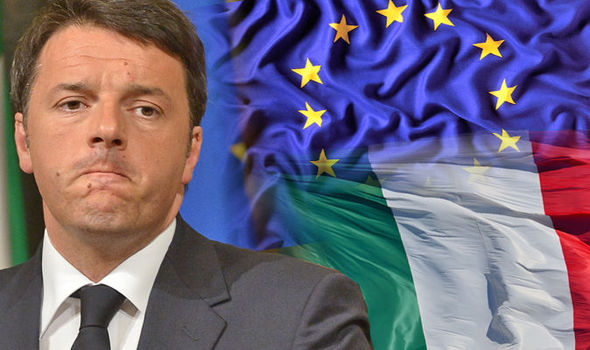By
Tom Arms
It’s as if Brexit was a loose thread in the complex political tapestry of the European Union. The Eurosceptics worked Britain loose and are now pulling with all their might on the rest of the fabric.
The next thread could well be Italy.
Next week Prime Minister Matteo Renzi announces the date of a referendum to introduce a major—and much needed – change to the Italian constitution.
The Italians have a penchant for drifting from political crisis to political crisis. This is partly caused by the fact that the 315-strong Upper chamber—the Senate– regularly blocks the work of the 630 deputies in the lower house.
So Matteo Renzi came up with a plan to reduce Senatorial power by slashing its membership to an indirectly elected 100 and turning it into a largely consultative body.
He won a parliamentary majority for the plan, but failed to achieve the two-thirds required for it to be enacted. Not to worry, says Renzi, Article 138 of the Constitution allows the government to go over the heads of fellow politicians and appeal to the public in a referendum.
The problem is that other issues are muddying the waters in much the same way as they did with Britain’s Brexit vote. Most of these issues have nasty economic roots.
Italy has yet to set foot on the post-2008 road to recovery. In fact, in the past eight years its economy has shrunk by almost one percent. The official unemployment rate is a scary 11.4 percent and some economists put the unofficial level at a nightmarish 20-25 percent.
A contracting economy has lots of repercussions. For a start, it means lower tax revenues for an overstretched treasury. Another is banks landed with mounting bad debts as Italian businesses collapse. The bad debt mountain currently totals $350 billion–a fifth of Italy’s annual economic activity.
Five Star Movement’s candidate Virginia Raggi gives a press conference after winning the Rome mayoral election in June 2016 – Tiziana Fabi/AFP
Particularly hard hit is Italy’s third largest financial institution the Banca Monte dei Paschi. It desperately needs cash to stay afloat. Renzi wants to prop it up with government funds, but Italy is part of the Eurozone and government bail-outs are against the rules until the bank’s creditors have borne the brunt of the losses. The problem is that in Italy the creditors are not the big institutions as in other countries but small investors. Playing by Euro rules would be a political disaster.
Then there is the immigration problem. Most of Europe’s attention is focussed on displaced Syrians currently detained in Turkey and anxiously seeking homes in Northern Europe. But even before the Syrian civil war Italy was trying to cope with North African boat people crossing the Mediterranean. In one month alone in 2016, 24,440 refugees landed on Italian soil.
Last week Matteo Renzi flew to the EU summit in Bratislava to put his case for help with both the immigration and banking problem. But his fellow European leaders turned their backs on him. As far as the banks were concerned German Chancellor Angela Merkel simply declared that ‘rules is rules’. Immigration was swept under the carpet and instead there was a lot of talk about an EU Army.
Renzi was furious. He refused to appear at the post-summit press conference and dismissed the gathering as no more than a “pleasant boat ride down the Danube.”
He is seriously worried that his constitutional referendum will be hijacked by the economic and immigration issues. This can only benefit Italy’s fast-rising Eurosceptic Five Star Movement which has pledged to pull Italy out of the Eurozone. Not a full-scale exit but a big step in that direction. Renzi has promised to resign if he loses the referendum. The Five Star Movement is well placed to make big gains in a subsequent election.
Euro fanatics such as European Commission President Jean Claude Juncker may achieve the federal Europe they desperately desire. But their inflexibility is likely to result in the European flag having a lot fewer stars than it has at the moment.
Tom Arms broadcasts on world affairs for a number of US radio stations including WTKF, all of which can also be heard on LookAhead News. His Weekly Viewpoints discussion programme can be heard at 1830 EST on Wednesdays and his LookAhead at the next week’s main events on Fridays at 1800.
LookAhead Radio World Report for week commencing 26 September:




No Comments Yet!
You can be first to comment this post!